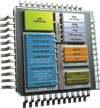

NXP Semiconductors has rolled out its LPC1200 industrial control series of MCUs featuring the ARM Cortex-M0 processor.
It extends NXP’s 32-bit ARM microcontroller continuum and targets a wide range of industrial applications in the areas of factory and home automation, such as white goods, motor control, power conversion and power supplies. It also expands NXP’s Cortex-M0 microcontroller offering with a wide range of Flash memory sizes. LPC1200 customers can now choose the exact Flash memory size they need, ranging from 32 KB to 128 KB in increments of 8 KB.
The LPC1200 product platform is specifically designed with flexibility and customisation in mind, making it suitable for a wide variety of energy-efficient system and power management requirements. For example, in advanced washing machines, the LPC1200 can control the motor systems, handle the user interface, monitor system power consumption, and manage off-board communications. Its high-current GPIO can directly control TRIACs without the need for external transistors.
In tomorrow’s energy-efficient smart appliance designs, the CPU will not only have to manage the user interface and control, but will also increasingly be required to drive multiple motor systems, as well as continuously measure current and voltage to calculate active power with high accuracy. The LPC1200 series meets these demanding system requirements with its high score of over 45 in CoreMark CPU performance benchmark testing, equivalent to 1,51/MHz.
For high-volume applications, the LPC1200 platform can provide rapid delivery of application-specific solutions (ASSP) for a wide range of industrial control requirements, through flexible interconnections between the interrupt controller, DMA subsystem, on-chip peripherals and GPIO. By recognising external and internal events and carrying out pre-defined tasks without CPU intervention, the CPU load is dramatically reduced, allowing the CPU to remain in power down longer.
The MCUs offer over 50 Flash and SRAM memory combinations. In addition, the small 512 Byte erase sector of the Flash memory brings multiple design benefits, such as finer EEPROM emulation, boot-load supports from any serial interface, and ease of in-field programming with reduced on-chip RAM buffer requirements.
Taking advantage of the ARM Cortex-M0 v6-M 16-bit Thumb instruction set, the LPC1200 has up to 50% higher code density compared to common 8/16-bit microcontrollers performing typical tasks. NXP’s unique SRAM architecture allows the LPC1200 to minimise power by automatically setting each of the 2 KB low-power blocks into its lowest possible power mode.
The LPC1200 comes with a set of peripherals that are specifically suited for appliances and industrial design. These include a windowed watchdog timer with an independent internal oscillator source, designed to comply with IEC 60730 Class B safety requirements for white goods; a programmable digital filter on all GPIO pins allowing better control of signal integrity for industrial applications; and I2C with Fast-mode Plus feature with 10x higher bus-drive capability compared to typical I2C I/O drives, allowing for twice as many devices on the same bus, as well as longer transmission distances.
The devices also include an optimised ROM-based divide library for Cortex-M0 offering several times the arithmetic performance of software-based libraries, as well as a highly deterministic cycle time combined with reduced Flash code size.
Dual analog comparators with 32 levels of voltage reference are provided; edge and level detection and output feedback loop support multiple states, such as monostable, a stable or simple set/reset.
© Technews Publishing (Pty) Ltd | All Rights Reserved